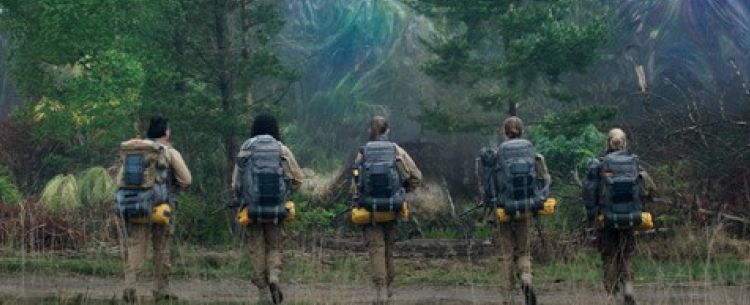CONTAINS SPOILERS
 (5 / 5)
(5 / 5)
Alex Garland is one of the relatively few directors working today who truly deserves to be called a visionary.
His latest film, Annihilation, a dreamlike adaptation of Jeff VanderMeer’s novel of the same name, is, to say the least, a smart, ambitious, multi-ethnic, female-led sci-fi.
To give him his full due, it’s astonishing.
Natalie Portman takes the lead as Lena, a microbiologist and sole survivor of the shimmer; a huge dome of energy that is expanding beyond the military’s capabilities to contain it or keep it quiet. The rest of the team she entered with are missing, presumed dead – along with all the other drones, people, even animals they’ve sent into it – and Lena herself seems disoriented.
Where 2016’s Arrival, perhaps the best sci-fi film of the decade up until this point, imagined our attempts to communicate with an alien species with a language and perspective radically different from our own, Annihilation takes a leap further into the unknown: what if the extraterrestrial force we encounter is beyond understanding?
While in other hands that notion might prove frustrating, here it’s thrilling. Once Lena and the rest of the team – all female, all scientists – pass into the opalescent bubble, they discover a maelström of change. Radio signals refract and the laws of nature are rewritten, seemingly erratically. Instability rules and everything that makes us who we are individually, what makes us human, is called into question.
Needless to say, there are questions, but the film’s screenplay, also written by Garland – previously best known as a screenwriter – isn’t interested in simple answers.
Psychologist Dr. Ventress (Jennifer Jason Leigh; bringing a sense of caged ferocity), no-nonsense paramedic Anya (Jane the Virgin‘s Gina Rodriguez), speccy physicist Josie (Tessa Thompson; a revelation after her performance as the warrior Valkyrie in Thor: Ragnarok), and geologist Cass (Swedish actress Tuva Novotny): all at the top of their fields, yellow sleeping bags slung below their rucksack like proton packs, venturing into the anomaly; each in search of something.
There is beauty, too, as well as intellect – pastel coloured growths erupt from trees and chittering albino deer frolic in. And there is madness and death: disassembled human skeletons laid out neatly on a beach, all their heads in a row, like a work of minimalist sculpture; a mutant like a giant, skull-headed anteater utters the haunting cry of a dying woman.
A call for pity mercilessly re-appropriated, either as an intentional lure or, perhaps worse, at random; as unknowing mockery.
It might be inexplicable, but, unlike in The Cloverfield Paradox, there is a logic at play in these aberrations; vast and fractal, even if we can’t quite discern it. Ben Salisbury and Geoff Barrow’s cavernous score – swirling, buzzing, droning – hints at a discordant majesty beyond understanding.
Flowering trees take the shape of people, or visa versa, as if a green-thumbed Medusa were at play, but if this is an Eden, as Rob Hardy’s pale, idyllic cinematography suggests, then its one in which God has decided we have no place.
Reportedly inspired by Tarkovsky’s Stalker, in style as well as plot – it was, according to Hardy, “the only film in the research library” – Annihilation‘s striking, otherworldly imagery also recalls the work of J.G. Ballard (crystal trees) and H.R. Giger (biomechanical architecture). Apocalypse Now, too: a journey into darkness or, perhaps, light.
In another reference to Alien, intentional or otherwise, Oscar Isaac plays Kane, Lena’s husband, who, slick-haired and dead-eyed, conveys a sense of focused absence. In 2015’s Ex Machina, Garland’s directorial debut, it was humankind – a character portrayed by Isaac no less – who intended to recreate ourselves through technology, and, in doing so, created an outsider; something beyond us.
Where that film was cold, calculating, Annihilation is warm, elemental; cells like sunspots, a swirling universe of energy in a droplet of blood. Here, the thing beyond us mimics us beyond psychology, without intention or design, and in doing so creates..?
A beacon is lit, but not as intended. In its attempts to learn from us, we give God the gift of death.
Life, death, transformation. Beauty, emotion, intellect.
This is film that encourages rumination and waxing poetical. Challenging, fascinating, Annihilation is the first miracle of cinema I’ve seen this year; a genuinely thought-provoking masterpiece. Not bad for a “Netflix Original”.
If the viewing platform can only find a way to put it in front of the right audience, they might just have a rare classic on their hands.
